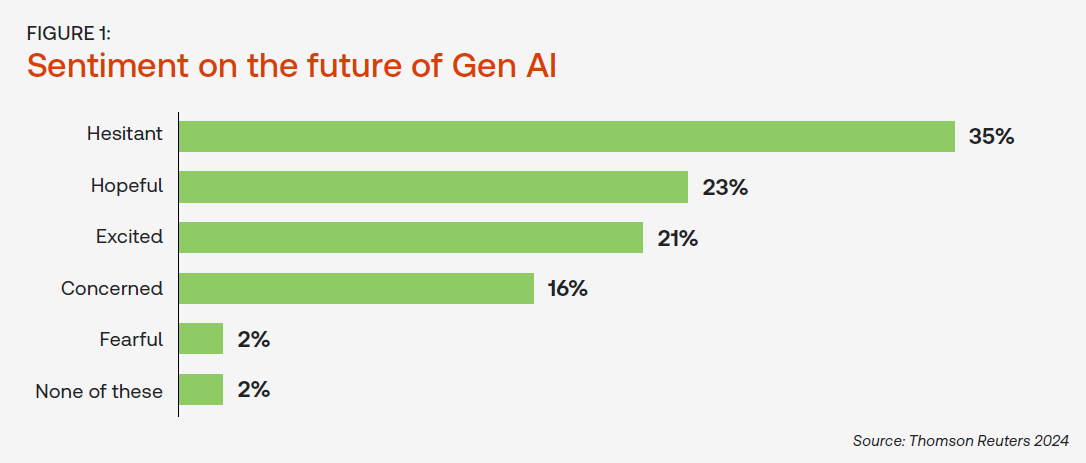A new report on generative AI reveals that most service professionals believe GenAI will be a large part of their future — and the work to prepare for that needs to begin now
Generative artificial intelligence (GenAI) is no longer the technology of the future — it is here now. The process of integrating GenAI systems into daily work — and figuring out what that means for the future of professional work — has begun.
Professionals in service industries such as legal, tax & accounting, risk & fraud, and government operations have long adapted to new ways of working, at varying degrees and to differing extents. Upon ChatGPT’s initial public release in late-2022, however, GenAI and related technologies have promised a more disruptive potential. Indeed, GenAI offers the opportunity to create entirely new content, in plain language or easy-to-understand images, in a way that mimics human output in a fraction of the time.
To dig into the potential GenAI revolution and its impact on how professional service work is done, the Thomson Reuters Institute recently published its 2024 Generative AI in Professional Services report. The survey was conduct online with 1,128 respondents in January and February 2024. Respondents were screened to ensure that they were familiar with GenAI technology and were located in the United States, the United Kingdom, Canada, Australia, and New Zealand.
Interestingly, the report found that while GenAI usage is currently not widespread, many professionals believe that GenAI can and should be used in the future — and many of their organizations are already making preparations for that reality.
The current state of GenAI
As the report shows, GenAI use is still in its nascent stages, with many more organizations exploring the technology than actively using it on a daily basis. About one-quarter of the report’s survey respondents said their organizations were already using GenAI or had active plans to use it, with usage higher among all legal and corporate risk & fraud respondents than for tax & accounting or government respondents.
Almost one-third of all respondents said their organizations were still considering whether or not to use GenAI. This could be one-off usage of public platforms such as ChatGPT, but increasingly, this also includes tools built specifically for industry use cases — such as legal research or drafting tools, or those that could spot accounting irregularities or aid in tax return preparation, risk assessment, and compliance reporting.
At the same time, the report shows that many service professionals are still figuring how to integrate GenAI into their daily work product and into their overall business plans as well, with no uniform answer among legal and tax professionals as to how they plan to approach GenAI costs and whether GenAI will cause their rates to raise.
Looking to the future
For all the questions currently surrounding GenAI, there is a growing feeling that its presence will continue to be felt for years, across all industries.
In fact, early sentiments skewed positively towards GenAI’s impact on professional services. A large portion of respondents (44%) said they were hopeful or excited about GenAI’s introduction into their industry, while more than one-third of respondents (35%) said they were hesitant, and 18% said they were concerned or fearful.

This sentiment is reflected in how many believe GenAI can and should be used for work in their respective industries. A large majority (81%) said GenAI can be applied to their work, while fewer (54%) said they believe GenAI should be applied to their work. These figures are slightly higher than the responses to a similar question asked of for legal and tax professionals in a previous survey done in Spring 2023.
Further, among those respondents who said they believe GenAI should be applied to their work, many focused particularly on the business impact of the technology. Tax industry respondents, for example, pointed to increasing efficiency and productivity, streamlining work processes, and improving quality and accuracy of work. Legal industry respondents, meanwhile, pointed to GenAI’s potential for cost savings, its ability to allow professionals to spend more time on high-value tasks, and its capacity to aid in quality control checks.
Overall, the 2024 Generative AI in Professional Services report illustrates how the professional services market is reacting quickly to a potentially disruptive force in GenAI. Although its true impact may seem a proposition for far in the future, planning for its impact now is critical.
As our research shows, those proactive organizations that have already begun to explore how GenAI will change the future of their work will gain a distinctive advantage of those organizations without such inclination or planning.
You can download the Thomson Reuters Institute’s recently published 2024 Generative AI in Professional Services report here.







